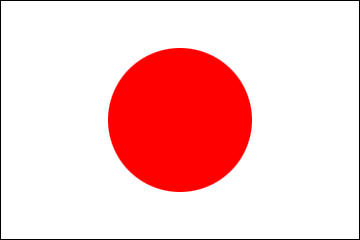Through the Eyes of the former Consul General Yamada (June, 2017 - July, 2020)

Thank You, Everyone
In life, it is customary that the stronger the affection, the harder the farewell. On July 1, I finally received my orders from the Ministry of Foreign Affairs to return to Japan. I will depart from Seattle the first week of August.
I have always felt reluctant to leave any assignment location, but this departure is especially hard. I was attracted to the caring hearts, high morals, independent minds, tolerance, and positive spirit of all those I had the honor to meet in Washington and Montana. Besides, I had the opportunity to learn and reflect on the complicated nature of international relations deeper than before through meeting individuals in the Japanese American community.
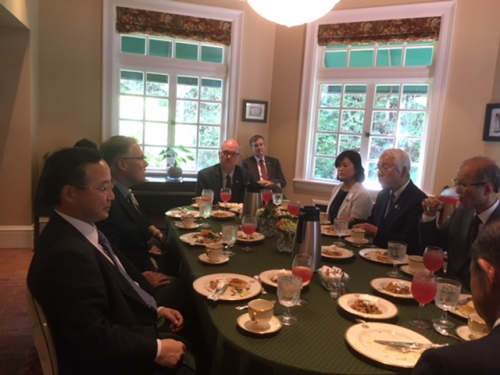
Me dining with Governor Inslee (WA State) and Governor Ido (Hyogo Prefecture)
On July 8, I received a phone call from Mr. Schuyler Hoss, Director of International Relations and Protocol of the Offices of the Governor and Lieutenant Governor He told me that Governor Inslee has instructed that I be awarded Honorary Citizen of the State of Washington. It came out of the blue, but he said that it was true. I replied with my deep thanks for the honor and would humbly receive it representing the entire staff of the Consulate office that have worked diligently to advance our relations. After the phone call, memories of the past three years came up in my memory one after another.
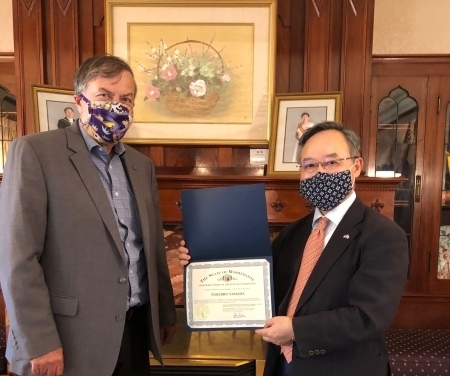 |
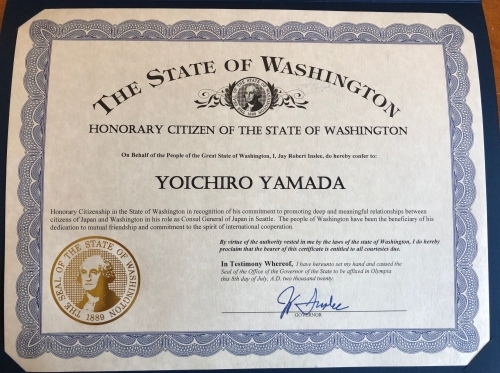 |
| Receiving the Honorary Citizen of The State of Washington from Mr. Schuyler Hoss, July 2020 | |
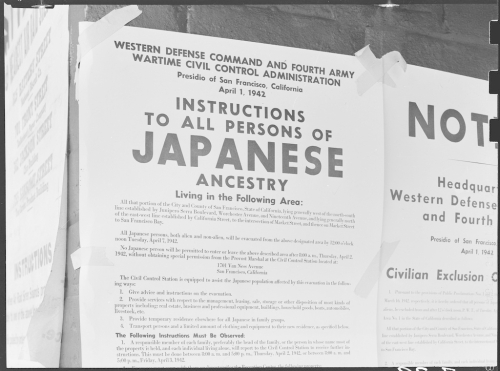
“Posted Exclusion Orders” (Source: Densho, Courtesy of the National Archives and Records Administration)
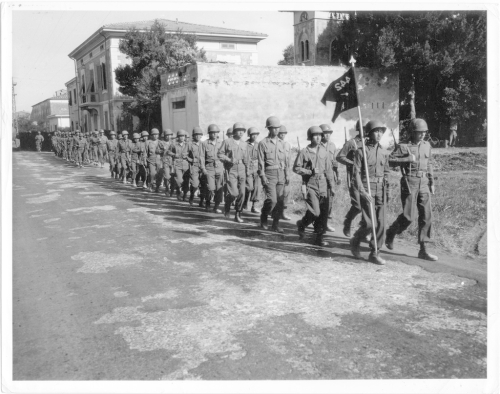
“Nisei Soldiers Marching” (Source: Densho, Courtesy of the Seattle Nisei Veterans Committee and the U.S. Army)
Before WWII, despite experiencing racial discrimination, Japanese immigrants were beginning to build their social and economic position in the U.S.; with the beginning of the war between Japan and the U.S., all that was shattered. The existing prejudice and hatred towards the “Japanese” on the West Coast exploded, provoked by Japan’s attack on Pearl Harbor. The hard work and efforts that the Japanese immigrants and their descendants had put, such as cultivating rough terrain, were instantly lost, and 120,000 Japanese Americans were sent to incarceration camps. In order to prove that they are truly American, young Japanese Americans enlisted in the U.S. Armed Forces. Comprised of only Japanese Americans, the 442nd Regimental Combat Team (RCT), while suffering immense casualties, made heroic breakthroughs. However, despite their second-to-none wartime accomplishments, due to the continued prejudice and hatred against them, the second-generation (Nisei) Japanese American soldiers were denied their joining of the American Legion. Thus, they created their own Nisei Veterans Committee (NVC). Discrimination and hardship on the basis of their Japanese provenance continued even after being released from incarceration camps post-war. There were incidents of when they visited Japan in hopes of visiting their roots, they were told thoughtless words such as, “your ancestors have abandoned Japan.” Against these backgrounds, there has been long-lasting emotional separation even between the Consulate-General of Japan and NVC.
On September 30, 2017, with the help of NVC leadership, Mr. Dale Kaku, Mr. Allen Nakamoto, Mr. Yuzo Tokita, and Mr. Bryan Takeuchi, we were able to welcome the members of NVC to the Residence. Men of the 442nd RCT, Mr. Tosh Okamoto, Mr. Tosh Tokunaga, Mr. Ed Horikawa, Mr. Frank Nishimura, and Ms. Louise Kashino-Takisaki, the widow of the late Mr. Shiro Kashino, were able to attend. Tosh and Louise have since passed away; I feel very honored and fortunate for having had the opportunity to meet them prior to their passing.
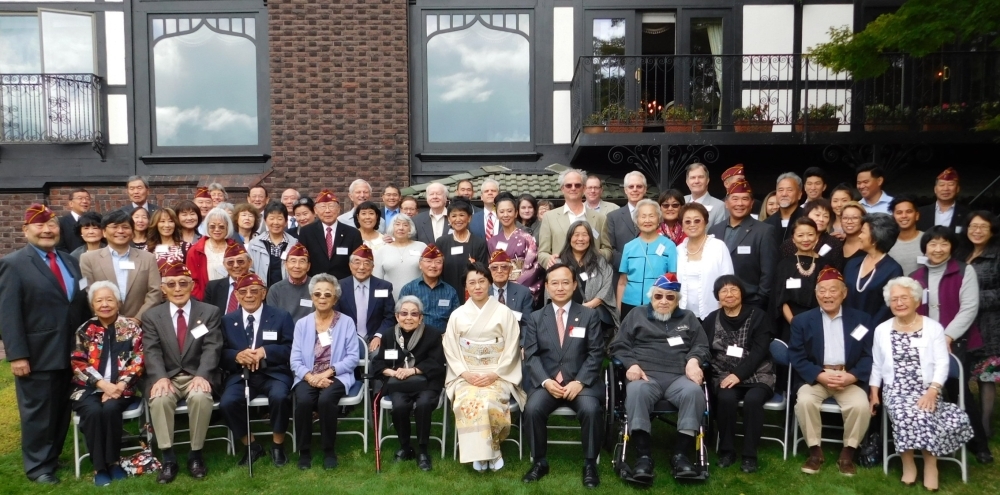 |
|
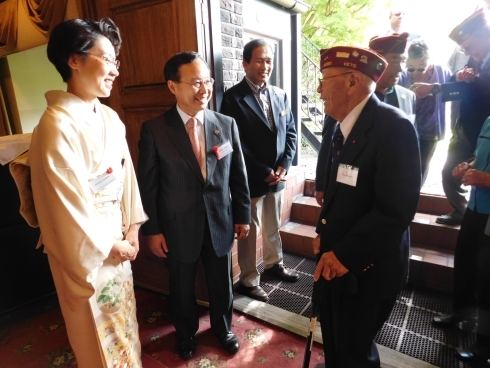 |
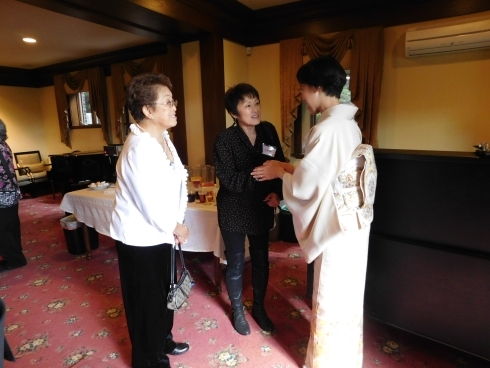 |
| NVC Reception at Official Residence, September 2017 | |
The U.S. Armed Forces that fought a bitter war against Japan during the World War II became a supporter for the democratization and economic restoration of Japan. Today, the U.S. forces are Japan’s most trusted ally. In the State of Washington, there are navy and army units that have close relationships with Japan. We held a reception at the Official Residence, inviting the U.S. Navy in March and the U.S. Army in April 2018. On each occasion, the commanding officer from each service attending the reception arrived in two large buses with service members who were stationed in Japan in the past, providing a wonderful opportunity to interact with them together with Japanese and Japanese American community representatives. The service members shared their stories of the onsen (hot springs), leisurely experiences, and other memories of Japan. Typically at receptions, we usually prepare more than enough food for guests. For these two receptions, though we prepared even more food than we usually do, we had hardly any leftovers at the end of the event. Of the 50 or so receptions we held at the Residence in the last three years, the only other time that we had almost no leftovers was when we hosted a reception to award the judo dojos with the Foreign Minister’s Commendation. As the host, it was an absolute pleasure to see. Thank you for your great appetite!
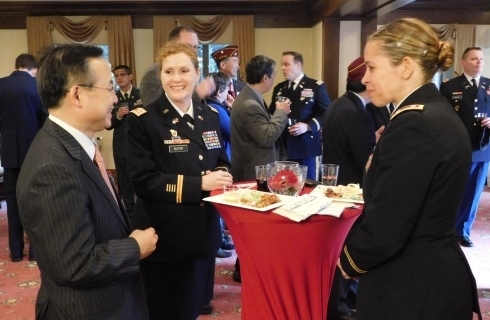 |
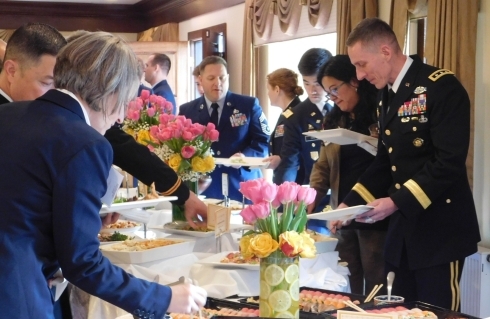 |
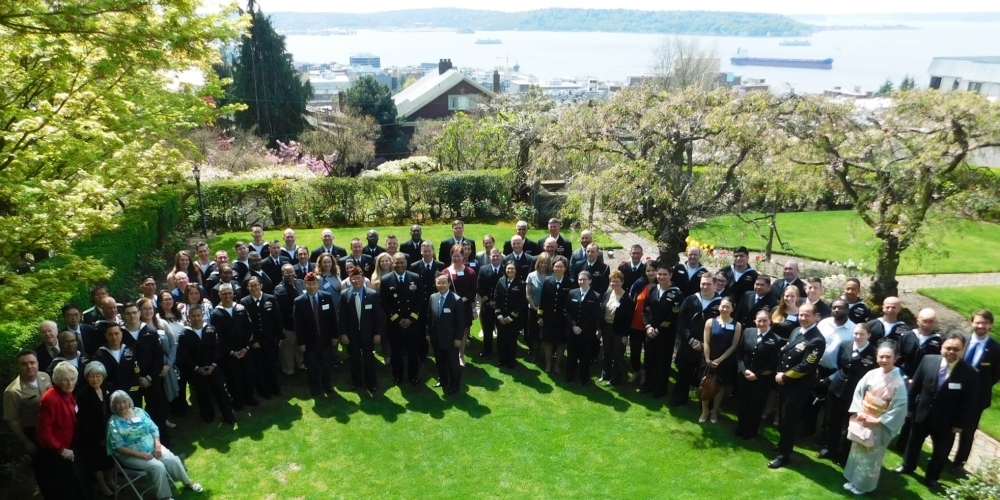 |
|
| Tomodachi Receptions, March and April 2018 | |
Traditionally, the two large receptions hosted by the consulate at the Official Residence were both held in the winter: the Emperor’s Birthday reception (National Day Reception, previously in December and now in February/March) and New Year reception (January). One of the best features of the Residence is its view, located up on a hill, but we were unable to use the outdoor space in winter due to safety concerns with the snow and ice. Right when I was looking for an excuse to hold a reception during the summer, lo and behold, someone told me about the signing of the extension of the Memorandum of Cooperation (MOC) between the Government of Japan and the State of Washington that was due at the end of June. If it is June, we can have many of our guests attend the reception and enjoy socializing outdoors until the sun sets. Perfect! Thus, we decided to hold a Summer Reception for the first time. As we sought for sponsors, Uwajimaya, Washington State Wine, and JFC International (Sapporo Beer) kindly participated. Since it was so popular, we held a Summer Reception again in June 2019 to celebrate the “Anniversary of the Japan-Washington State Relationship.” Guests savored some barbeque and great wine and beer, while enjoying the sunset as they joyfully mingled. The timing of the signing of, as well as the content of, the Memorandum of Cooperation was amazing and memorable. (Unfortunately, we were unable to hold the Summer Reception this year, due to COVID-19).
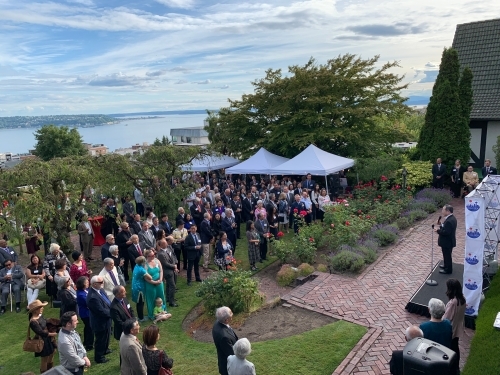
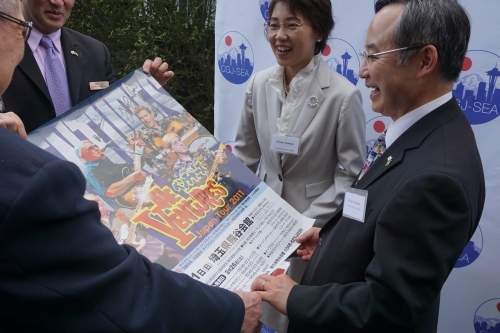
Summer Reception, 2019 (The Ventures’ Don Wilson joined us that evening.)
During my three years here, I have worked on the issue of divorces among international couples. Among the permanent[AR1] -resident Japanese citizens living in Washington State, many are married to American citizens. Unfortunately, there are a number of them who become victims of domestic violence after marriage, and if they choose to get a divorce, the process often puts them at a disadvantage in many ways. This leads to the imposition of unfair conditions regarding property division, child support, and child custody arrangements. Many are forced into poverty due to the unreasonable conditions they are submitted to after a divorce proceeding. I learned of the severity of this issue from the consulate’s general counsel, Naoko Inoue Shatz, who has been working on these cases for many years as an attorney. Though I wanted to do something, at first I was, quite frankly, not sure what I could do to help. (Please see Columns 29 and 30 for more information about this topic.)
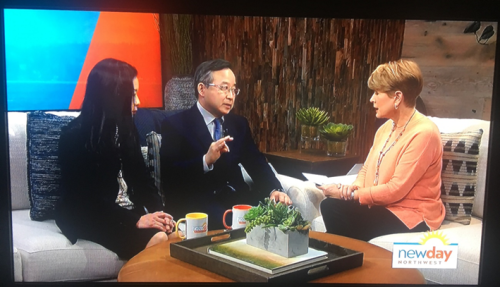
Interview with me and Ms. Inoue Shatz on the immigrant spouses issue (Photo Credit: King 5)
At any given time, there are over 50,000 US military troops stationed in Japan; many Japanese women marry service members. I became acquainted with several commanders during my time here, and learned from them that on a regular basis, a portion of their time is dedicated to addressing family issues among their service members. In May 2018, I invited Rear Admiral Scott Gray, then Commander of Navy Region Northwest at Kitsap-Bremerton Naval Base (now serving as a commander in Naples, Italy), to the Official Residence where we discussed the immigrant divorce issue. Days later, he took to bring the issue to the attention of the U.S. Department of Defense. A few weeks later, the Rear Admiral informed me that Pentagon’s navy official had recognized the importance of the issue, and he would take action on it. This led to Ms. Karen Boeve, who is in charge of family support programs at Naval base Kitsap-Bremerton, becoming a key person in bringing others in her position at bases across the county to Washington State to exchange experiences and ideas. As a result, an informational pamphlet was made to inform immigrant spouses of their rights during divorces. Those pamphlets have now been shared throughout the U.S. naval bases and fleets around the world. From this experience as well, I felt the willingness Americans have to address a problem by urging their own organization to take action.
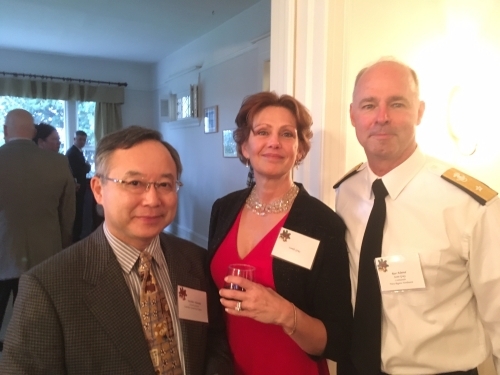
Me with Mrs. Gray and Rear Admiral Gray
My last big memory is of an event that took place just before the coronavirus lockdowns began: Ikebana x Technology. Nikkei Business Press published a comprehensive article about it, which can be viewed here (in Japanese). https://special.nikkeibp.co.jp/atclh/NBO/17/microsoft0419/p19/
In July 2018, I first discussed this idea with Hiroki Ohara, fifth Headmaster of the Ohara School of Ikebana (whom I had met at my previous posting in Belgium) and, over the course of a year and a half, preparations were steadily made. The Ohara School, Microsoft Japan, software development company Nangok R/Studios, the Seattle Chapter of Ikebana International, the Japan Fair organizing committee, and our consulate office worked together, from both Tokyo and Seattle, working down to the wire to make the event a reality. On the stage the project came to fruition, with ikebana performance art coming together for the first time with mixed reality technology (a combination of the real world and virtual graphics) in a new ikebana show experience. All Nippon Airways, Mitsubishi Aircraft, and other Japanese companies, several foundations (Blakemore, Oki, Tateuchi), Visit Seattle, and the late Paul Allen’s cultural organization, Vulcan Arts + Entertainment, kindly co-sponsored the event. Groups of students from various local high schools were also in attendance at Benaroya Hall that evening.
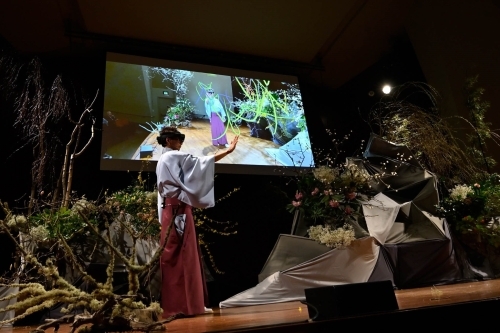
Ikebana X Technology, February 2020
The event took place on February 27. Just two days later, on February 29, the first death from the coronavirus was confirmed in Washington State, leading to the declaration of a state of emergency, and the subsequent cancellation of large events. When first making preparations for the event, we had initially considered holding it during the first week of March, but a year before the event was to take place we moved it up by one week. If we had kept our original plan, it’s likely we would have had to cancel it altogether. We were quite lucky.
Lastly, I want to touch on the most important group of people in the relations between Washington State and Japan: Japanese Americans. We owe the current strong relationship of mutual trust between the U.S. and Japan to the longstanding endeavors, integrity, and patriotism (for America) of Japanese American citizens. After serving here in Seattle for three years, I have become confident in that assertion. Not long after I arrived in 2017, while attending an event in Puyallup to mark 75 years since Japanese American incarceration, I learned a valuable lesson about how history can be brought into our present-day activism. And over the course of the past three years, through working with many different organizations in Seattle, including the Nisei Veterans Committee, Nikkei Jin Kai, the Japanese Cultural & Community Center of Washington (JCCCW), the Densho Project, prefectural clubs, judo dojos and the Panama Hotel, I witnessed the vitality, adaptability, and wealth of ideas within this community and could see Japan-US relations from a new perspective. I am also thankful to the Holocaust Center of Seattle and Music of Remembrance, two local Jewish organizations, for teaching me invaluable lessons in how to face our shared history. I heard that before WWII, the main Japanese and Jewish neighborhoods of Seattle closely bordered each other. I find it very meaningful to see these two communities coming together to fight prejudice in our current time, just as they have before.

Over the past three years living in this hub of 21st century technological innovation called Seattle, I’ve learned about the complicated and important relationship between Japan and the US, experienced the importance of person-to-person exchange through sister city relationships and university and JET Program exchanges, and lived a truly fulfilling three years here. I would like to thank everyone once again, from the bottom of my heart, for all your support, encouragement, and opportunities to connect. Years from now, I would like to come back to Seattle to once again absorb this city’s energy and ideas and to gain an objective view of Japan’s past, present, and future. Until then, please take care, everyone. Sayonara.
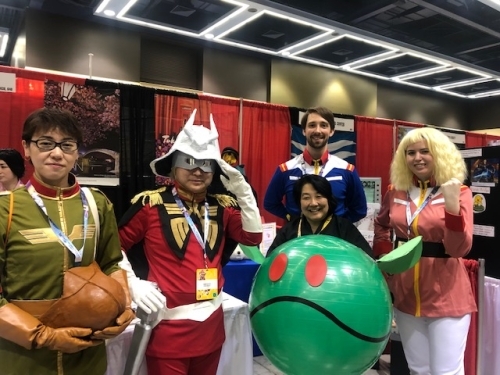
Sakura-Con, 2019
